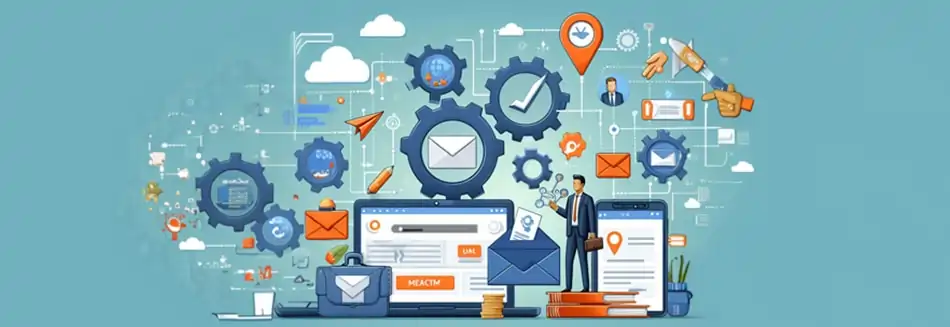CRM and B2B email marketing, when used together, become a powerful tool for generating Sales Qualified Leads.
It all starts with B2B communication, which has a slightly different way of operating than dialogues with direct consumers.
When it comes to business between companies, decision-making involves bureaucratic processes and the involvement of many people. This is why B2B communication requires specific treatment due to corporate barriers.
And how can we facilitate dialogue between companies that have other companies as customers? CRM – Customer Relationship Management – is a technology that records and analyzes the behavior of potential customers and leads.
In this way, marketing teams devise communication strategies that will meet the unique needs of each customer, using B2B email marketing as a bridge.
However, for email marketing to be a solid and secure bridge, there needs to be email verification. Only a sanitized and bounce-free mailing list can reach the recipients’ inbox.
Next, we’ll look at the particularities of each B2B component and their importance in generating qualified leads.
How CRM works in the B2B system
CRM technology speeds up negotiations, since the buying and selling process in the B2B model is more complex.
Each customer has their purchasing behavior recorded, and this helps to create communication that promotes solutions capable of adapting to each company’s philosophy.
In this way, joint decision-making – which is common in corporate environments – is quicker.
The CRM works like a compass that guides the location of professionals within the sales process and so productivity reaches better levels.
Subsequently, the integration between CRM and B2B email marketing will complete the whole process.
How B2B email marketing works
Email marketing is a channel for business opportunities, as B2B audiences are usually looking for a solution that meets a specific need.
It is often email that plays the role of strengthening relationships with customers. After a first contact with the sales team, sending a message is a standard of corporate conduct.
B2B email marketing communication must follow a plan that takes into account the marketing funnel.
It’s important to note that the marketing funnel is different for B2B audiences, since the buying and selling relationship between legal entities requires a higher ticket.
In negotiations between companies, the budget factor is decisive, which is why B2B email marketing communication is much more concise and objective.
Do you know what types of email marketing are and how to communicate with each of them? Watch our video and find out more about this subject!
CRM and B2B email marketing working together
When it comes to the customer experience, a CRM linked to B2B email marketing boosts conversions.
The CRM has the role of understanding customer behavior, and email marketing will act on the information provided by the CRM to carry out actions that stimulate sales. In short, email marketing complements the role of CRM.
When it comes to corporate negotiations, the more bureaucratic the process, the slower the decision to buy.
For this reason, the joint action between a good CRM and B2B email marketing with strategic communication simplifies negotiation time, taking on the role of meeting the specific needs of each business.
Generating qualified leads
CRM combined with email has one objective: to generate leads. However, unqualified leads get lost in the marketing funnel.
There are two classifications that define leads. See what they are:
- MQL – Marketing Qualified Leads
These are leads who are looking for a solution to a problem they already know about. And just as they know the problem, they also know and interact with your company’s content, but have not yet decided to buy. For this reason, marketing work is still necessary.
- SQL – Sales Qualified Leads
When a lead is sales qualified, it means that they have already decided that your company’s product or service is the solution to their problem.
This signals that the nurturing stages within the funnel are almost complete, with only a few steps (or just one step) left to make the purchase.
The purpose of integrating CRM and B2B email marketing is to qualify leads and nurture them within the funnel. As a rule, as MQL at first, and later as SQL.
FAQ
What is the function of a CRM within a B2B system?
At first, to record customers’ buying behavior so that the company can get to know its leads better. In this way, negotiations can be speeded up through a more personalized service. The result is increased productivity.
How should B2B email marketing be communicated?
As business relationships between companies require a higher ticket, the budget is considered a determining factor.
Communication must therefore be more concise and direct, so that purchasing decisions can be made more quickly. The marketing funnel will guide where the customer is in the sales process, so that leads can be qualified.
What are qualified leads?
They are contacts who know the problem they have and who are going through your company’s marketing funnel. They see your product as the ideal solution. As they progress through the funnel, they are more likely to decide to buy.
They are Marketing Qualified Leads when they have not yet decided to buy, and Sales Qualified Leads when they are one step away from doing so.
How is CRM and B2B email marketing integrated?
CRM generates customer behavior data, which will be used to develop communication strategies applied in email marketing.
In this way, email marketing acts as a complement to CRM functions, promoting continuous improvements in the user experience.



